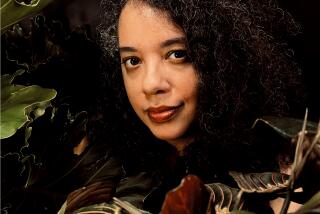FICTION : SORCERERS by Jacob Needleman (Mercury House: $16.95; 235 pp.).
- Share via
“Sorcerers” is a good-natured novel with all the problems novels have when they are written by nonfiction writers with thematic issues weighing heavily on their minds. Jacob Needleman wants to explore magic as a metaphor, but the metaphor grows like an out-of-control chemistry experiment into the realms of good and evil, power over other humans, artifice and reality, control over one’s own life until it loses all of its inherent luster.
Magic is compelling, and the reader’s need to discover whether this novel’s hero, Eliot, will become both a fine performer and a true magician should be allowed to fuel this book to its climax. But Needleman, as a nonfiction writer, does not believe in the interest that mere plot and characterization can create, so he behaves like a meddlesome deity eager to muck around in the world he has already set into motion. Because of this, “Sorcerers” goes as flat as week-old champagne.
Characterization is probably the major problem in the novel. Eliot, the adolescent main character who discovers that he has a frightening gift for mind reading at the same time that he becomes interested in a magician’s club that seems more sinister than it should, is empty of real human personality. We know virtually nothing about him, save for his magical capabilities and his interest in the other characters: Blake, an elegant and frightening charmer who heads the magician’s club; Falkoner, who owns a magic shop, and Irene Angel, who may or may not be alive, but is the club’s founder. This is slender stuff on which to base a whole novel, and a whole main character. When Eliot uses his powers, as he must inevitably do, to gain a young woman’s sexual favors, the lack of characterization of Eliot combined with this situation of virtual rape makes one so uneasy, and seems so nastily tasteless, that any charm the book had to this point is lost.
“Sorcerers” disappoints so much because it seems fraught with so much possibility. Why is this world of magic populated almost solely with Jews? Why isn’t the Cabala ever mentioned? What purpose does Irene Angel serve? The questions that arise are never answered. Instead, the author’s plodding, clunky, repetitive prose deadens possibilities.
Fiction is about character first, and ideas second. If this novel had chosen first to explore what happens when a precocious, rounded, real teen-age boy discovers he can gain power over the world because of a mind-reading gift, then tried to deal with the moral and philosophical ramifications of the boy’s decision, this might have been a fine novel. Because the gift grows out of proportion, while its owner languishes, “Sorcerers” becomes an exercise instead of an inspiration.
More to Read
Sign up for our Book Club newsletter
Get the latest news, events and more from the Los Angeles Times Book Club, and help us get L.A. reading and talking.
You may occasionally receive promotional content from the Los Angeles Times.









